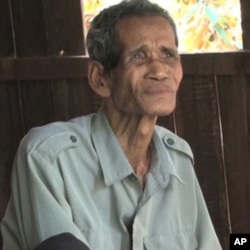Three decades since the Khmer Rouge decimated Cambodia, killing up to a quarter of the population in pursuit of a communist utopia, the devastation to families is still being felt. As the four most senior surviving Khmer Rouge leaders go on trial in Phnom Penh, thousands of lower-level Khmer Rouge responsible for atrocities will never see justice. Sometimes the victims and the accused are closer than they want to be.
Kraing Leav village is a typical rural Cambodian community just a couple of hours drive from Phnom Penh.
Everyone is somebody’s friend, neighbor, or relative.
But during the Khmer Rouge rule in the 1970s, fear descended on the village as people were accused of being counter-revolutionaries and began disappearing.
Seventy-one-year-old Som Chhorm says he was forced to join the Khmer Rouge but, like many cadres, he claims that he never held any rank or committed any atrocities. He says his job was to take care of cows. "I think now we regard the past as the past. We should consider the current government and try to forget our bitter past. We should try to rebuild our society," he said.
But just down the road from Som Chhorm’s house, the past is not so easily forgotten for Pol Yum.
The Khmer Rouge killed so many of her relatives that she quickly loses count.
One man who she holds responsible is Som Chhorm, who she says never herded cows and was actually the head of the local communist cooperative, a low-ranking Khmer Rouge. He is also her cousin. "He lived with my parents for a few years when he was attending primary school. But, I do not understand why he did bad things. He was an educated man. I still do not understand," he said.
Pol Yum says she talks to her cousin but she has never confronted him because, to this day, she is still a little afraid of him.
She does not want him prosecuted like the four senior leaders on trial in Phnom Penh but says, for her own sense or relief, he should come clean and tell the truth.
Neighbor Pol Sarath, confirms that Som Chhom is lying and was in fact in charge of the collective.
Like Pol Yum, she is also his relative, a distant cousin.
She, however, refuses to talk to him and says he should be brought to trial. “His punishment should be decided according to the law," she said.
Som Chhorm insists he is innocent and says the Khmer Rouge, who tortured members of his family and probably killed them, tried to force him to be a leader but he refused. “When the Khmer Rouge came they accused me of being a civil servant for the previous government or a secret agent working with the United States Central Intelligence Agency. But, after the Khmer Rouge dissolved I was accused of being Khmer Rouge because I have a big house like this as you can see. So now I am accused of colluding with the Khmer Rouge," he said.
Som Chhorm says he survived the Khmer Rouge by convincing them he was more useful alive than dead.
Pol Yum says she sometimes cuts and sews when she is feeling sad about the past and what happened to her cousin.
Although they live in the same village, and just a short walk from each other, their family remains divided by a past that continues to haunt them.
Watch: Victim of Khmer Rouge gives tour of notorious prison





